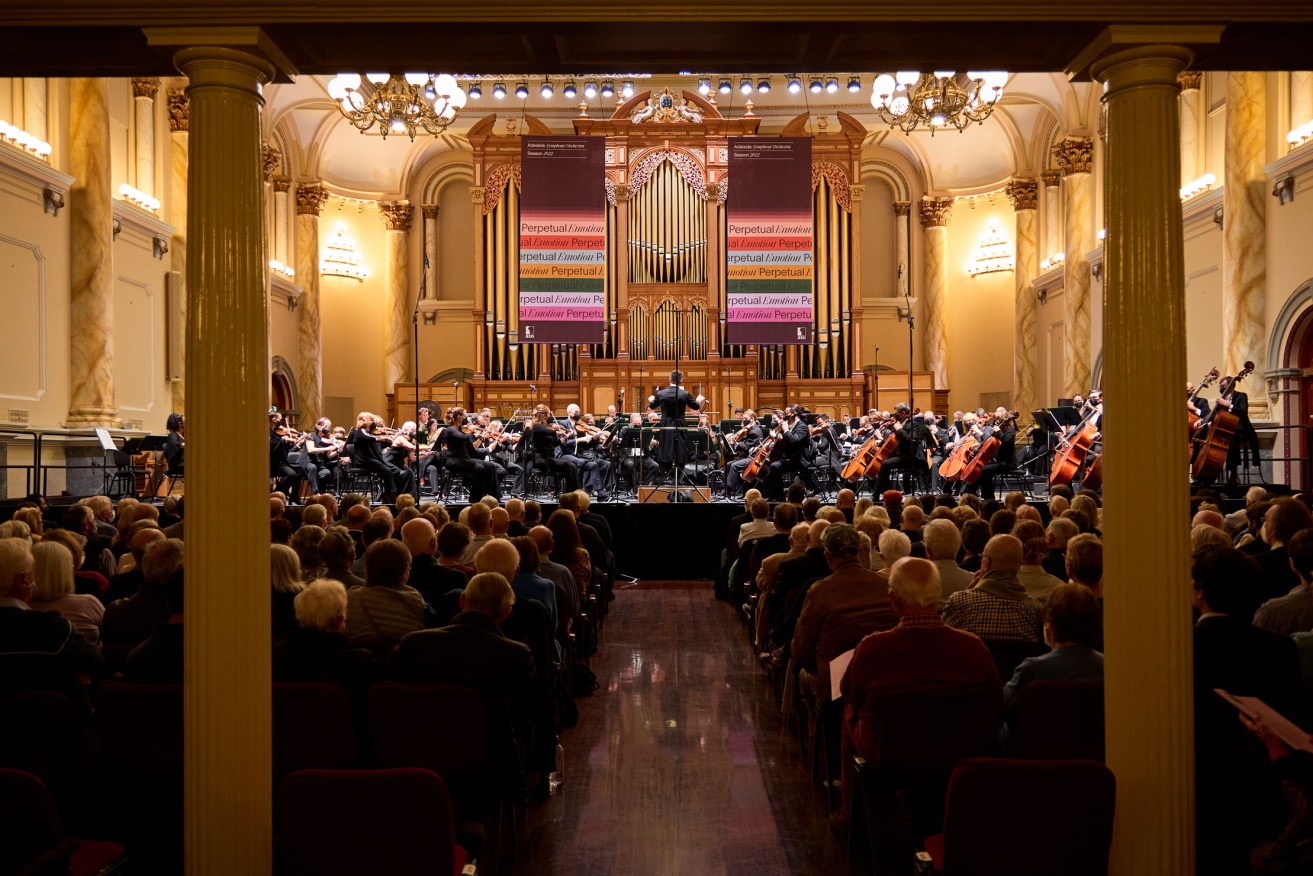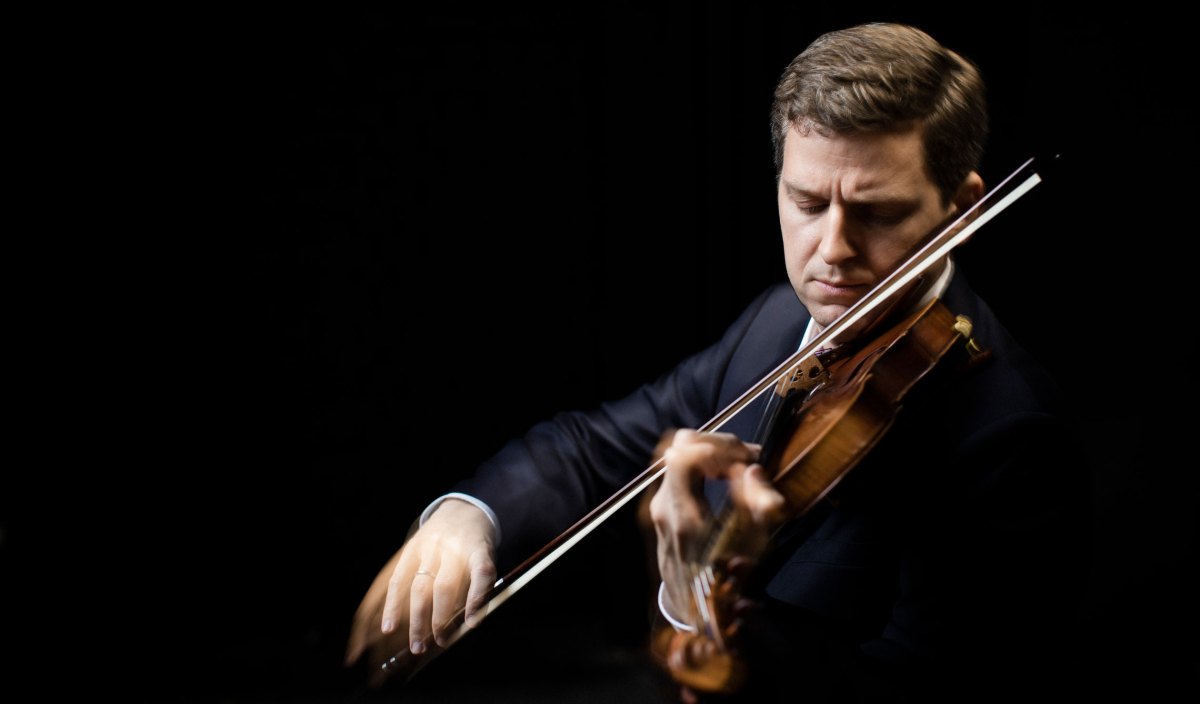Music review: ASO’s Vivacious
The Adelaide Symphony Orchestra’s final Symphony Series concert of the year featured sought-after Canadian violinist James Ehnes and a famously expressive conductor who was in his element with Strauss’s wonderfully over-the-top Rosenkavalier Suite.


The Adelaide Symphony Orchestra at the Town Hall. File image
With much interest surrounding James Ehnes’s return visit to Adelaide, here was a chance to hear this Canadian violinist again and see what he is made of. Where in 2016 he played the Beethoven Violin Concerto with the ASO, this time it was to be that darling of modern works, Samuel Barber’s Violin Concerto. Never mind stories about how it was commissioned in the 1930s by a soap maker (the business tycoon Samuel Fels), this endearingly melodic work has earned its place as one of the most liked “modern” works – and it was interesting to see how Ehnes, esteemed for his virtuosity, might take to its simple lyrical charms.
Adding another layer of interest to this concert was the person lined up for podium duties. Having not been to Adelaide before, Latvian conductor Ainārs Rubiķis is general music director at Komische Oper Berlin (Barrie Kosky being that company’s renowned manager), and is famous for his flamboyantly expressive gestures.
The orchestral opener was right up the conductor’s alley. Anna Clyne’s Masquerade is a piece of unabashed fun that recalls the cartoon music of Carl Stalling in its explosive smack of percussion and whirlwind of violins. Composed for the 2013 London Proms, this short piece is striking in its compressed energy, and Rubiķis and the orchestra were all over it. There’s a moment towards the end where its state of hyper-excitement almost relaxes, the strings squeezing in and out rather gorgeously like an accordion. But then it all blows up in your face with a monster finish.
There’s no doubting the masterful skill of Clyne. This London-born, now US resident composer has given Masquerade enough sophisticated gleam to prevent it descending to the lowbrow. But five minutes of breathless fun was enough.
Onto saner matters with the Barber concerto, and straight away one could admire the qualities of Ehnes. He produces a fuller, cleaner and somehow bigger sound than leagues of other violinists. Plus, he communicates in a more personable manner. Barber’s Violin Concerto demands these qualities, the violin ascending songfully right at the start against a hushed orchestra, with no preliminaries. And to have a musician playing it so directly and honestly was a revelation. Ehnes drew an outstandingly full, clear resonance from his instrument (reputedly a Strad) to convey the work’s simple but powerful eloquence.
A flood of nostalgic emotion takes place in the second movement when a sublime opening melody in the oboe passes to the violin. The playing here was special, the purity of line from principal oboist Joshua Oates yielding to noble statements from Ehnes that began very quietly and were tinged with sadness.
Things erupted in a tremendous show of bravura in the last movement, a fast moto perpetuo that really sorts out the champions from the pretenders. It wasn’t just Ehnes’s effortless precision that impressed, it was the way he found time to shape the merciless stream of fast notes that made this such a satisfying performance.
Met with rapturous applause, Ehnes obliged with a solo encore, the third movement of Bach’s Violin Sonata No. 2. His touch here was so flawlessly even that the melody, floating above pulsing quavers, made it seem as if two violins were present – miraculous.

Violinist James Ehnes. Photo: Ben Ealovega
It was as if Rubiķis was holding his breath all the while, because only with Richard Strauss’s Rosenkavalier Suite in the second half could he exercise his artistic muscles fully. This suite is wonderfully over-the-top music, even by Strauss’s standards, and the fact is that he probably didn’t arrange all of it anyway from his comic opera of the same name; apparently he left the rest of that task to Stokowski’s protégé, Artur Rodziński.
Lovers of excess could have wanted for nothing. Soon after a strident blare of horns comes a magnificent swooning main theme, and things only escalate from there. And in typical Straussian fashion it all coalesces into a Viennese waltz. In this, the orchestra comes to resemble an overblown dance band – which in turn makes it extremely difficult for a symphony orchestra to play. Rubiķis proved ideal here, stretching and pulling the rhythms to lend a gliding verve to waltz melodies and pushing hard where the energy levels suddenly upped. And the ASO were magnificent.
There’s an element of caricature in Strauss’s music even when he is serious – and this does happen in places in Rosenkavalier Suite. One felt Rubiķis was unerringly right in judging every expressive contour in this most voluptuous of scores.
But more was to come. Ravel’s La Valse is another seemingly decadent tribute to the waltz of an earlier epoch. In its gradually accumulating energy towards a tumultuous climax, it follows a broadly similar trajectory to Bolero; and in the process it does rather descend into the brash and bombastic. Ravel himself repudiated any suggestions that he had indulged in parody and said that La Valse was purely about music. Either way, this was a scintillating performance. Even more virtuosic for the orchestra, it had every player on their toes and playing brilliantly.
It could only be fitting, then, that the orchestra might offer an encore as well. Sibelius’s Valse triste served the purposes well and continued the ballroom theme. Its waltz rhythms here were yet more exaggeratedly elastic, but again well judged. Rubiķis is a one of the bolder conductors around at the moment, and it was marvellous to see what he can come up with.
Vivacious, presented at the Adelaide Town Hall, was the ASO’s final Symphony Series concert of 2022. This weekend the orchestra will celebrate Barbra Streisand’s 80th birthday with To Barbra, With Love at the Festival Theatre.




